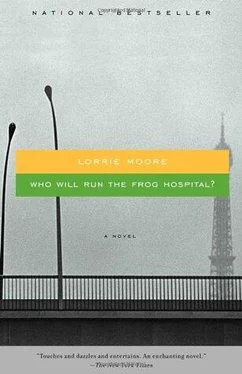I got in a wheelchair and for fun trundled up and down the corridors. Mike and Sils shared an understanding, newly worked out in Mike’s hospital bed, amid the sheets and TV and bad fluorescent lighting, that the accident had been caused by a combination of her abortion and a truck.
I didn’t say a word. I zoomed up and down the hallways in the wheelchair, nodding good morning to everyone. I smiled in a cheerful but authoritative manner. One time I accidentally backed into an elevator and went all the way down to the lobby. Once I was there, I decided to see how far I could go. I pushed through the revolving door. I hit the street.
No one stopped me. I wheeled myself halfway downtown — past the hospital gardens, past the guest houses and the Grand Union and the junior high. I even tried a wheelie off the curb, which spilled me out into the street and scraped my knee, but still no one was looking. Finally, I turned around and pushed the thing back. I stopped at the Grand Union and got a Coke.
“Your father’s worried about you,” my mother said to me one night, in her nightgown, standing over me in a looming way.
“Dad?” I was clipping my toenails, sending hard yellowed crescents flying through the room with each clip.
“Will you stop that while I’m speaking to you? Have you no respect for anything?” She stepped in from the doorway and swatted my thigh.
“What?” I looked up. Her formerly bleached blond hair was now a tigerish mix of black and white; she was getting a mustache. Her hazel eyes flashed with hate.
“When I bring you to or from work, you’re sullen in the car, half the time we don’t see you at dinner, you haven’t spoken to your father or brother or LaRoue for weeks, or been to church in months, and how about your grandmother? Have you taken the time to go visit her? She doesn’t have that much longer to live, you know!”
My Grandmother Carr lived in a large Victorian house in the middle of Horsehearts. It was a house full of what my grandmother called “davenports” and “chesterfields.” “Don’t put your feet on the chesterfield, dear.”
“You mean the couch ,” my brother, Claude, always said, to be rude.
There were three cellos in the house; one had belonged to my grandfather. The other two belonged to my grandmother, who often gave lessons in town, and whenever we visited she got out one of the cellos and played a piece for us, while we sat on one of the davenports, squirming and pinching each other when she couldn’t see. Later, when I was older, I realized how beautifully she’d played. But when I was little, most of the interest such an event held for me was in watching such a formal woman—“a true Victorian lady,” as my father worshipfully described her — place this large woman-shaped object between her legs and hold it there with her knees, her finger vibrating along the neck in an insectlike movement up and down, the bow in a slow saw across the strings, angling this way or that, gently, to find the note. My grandmother always gazed down upon her cello, like the Holy Mother upon the Holy Child, or perhaps like one woman beholding another at her knees.
“Are you done?” Claude was often the first to ask, and my grandmother would smile with a kind of wan forgiveness and say, “Yes. I’m done.”
“I’ll go see her soon,” I said now to my mother. I’d made such a promise before, but what the heck: I made it again.
“And,” my mother continued, “Mrs. Lollick at church would like you to come help in the nursery again.” The year before, every third Sunday, while my parents attended the service, I had helped baby-sit in the Baptist church nursery — a large pink room with cribs at one end; at the other hung an enormous gold-framed painting of Jesus, whose upward gaze and caramel-colored locks gave him the look of a dewy Kenny Loggins. This alone made helping in the nursery better than sitting out in the sanctuary listening to the service, surrounded by old women in wool felt hats with fish-netty little veils, long furry animals draped heads and paws and all around the collars of their coats. During the sermons, I had always stared at the bright stained glass — Jesus as Shepherd — and, in my mind, recolored it, in head shop blacks and mauves. My parents had become Baptists after they had married, leaving the Catholic and Episcopalian churches for something they’d felt was more suited to them. Now they never missed a week. They sang in the choir. They ushered. They prayed.
“All right,” I said. “I’ll phone her.”
“And that’s not even my main point here,” said my mother. “The main point is that you seem drifty and unfocused.”
“What?” I grinned up at her and crossed my eyes. It was the sort of response I might have made to Sils, whom it would have cracked up, but to my mother it was only impudence.
She leaned over and slapped me hard across the face. “You heard me,” she said, and slammed the door.
Once, I went too far with the wheelchair; I went all the way downstreet, stopping and staring in the store windows. It was early morning, and no one was there. By the time I got back to the hospital, Sils had already left.
“Sils left,” said Mike. “She didn’t know where you’d gone.”
“I was outside, fooling around with the wheelchair.”
“She thought maybe you got sick of waiting.”
“Oh, well.” “Yeah. Oh, well. She didn’t know. She had to go to work.”
“So do I,” I said. Now I’d have to call my mother. Or a cab. “So, I should go myself.” Mike looked recovered to me. Confident and condescending in that boy way, that way that illness and injury usually eradicated. But now it was back. He was off the glucose drip. He was watching a lot of TV. “I’m glad you’re better,” I said.
“Are you?” He grinned, in, that strange lopsided style he had.
“Sure. What do you mean?”
“I mean, here’s me, all laid up in the hospital, and there’s you — probably with your lezzy fantasies—”
“What are you talking about, you pig?”
“I’m talking about you with Sils, how you act like … I don’t know. I’m just wondering. Thinking out loud.”
I picked up my big rope purse, which I’d left by the nightstand, and walked out.
“Oh, come on,” I could hear him saying behind me. “I didn’t mean anything.”
Isabelle, Herb, my mother, now Mike Suprenante getting on my nerves. My life like an old turnip: several places at once going bad. The next night it was Isabelle again. She called me up to her office, a large, polka-dotted room above the main entrance. I sat down in the card-table chair in front of her desk.
“What’s going on with your register?”
“What do you mean?” I was tense and held my back straight as a board.
“Sometimes you’re short, sometimes you’re over. Are you locking the register and taking the key on your lunch hour?”
“Yes.”
“Are you emptying the drawer and taking the money box with you on breaks?”
“Mostly,” I said.
She looked at me sternly. She wore spike heels and nylons, even in the direst heat, and I could hear one of her legs swing scratchily back and forth. “Don’t do that anymore,” she said about the money box. “We’re not going to do that anymore.”
“OK.”
“We’re going to put you over at the Lakeside entrance tomorrow.”
The Lakeside entrance was unknown to most of the tourists, and so it was always slow there. The times I’d worked there before I’d spent the whole time writing Sils a long note on a spare roll of orange ticket tape. The note had been full of jokes about Stan the security guard and Mary at the gift shop having an affair.
But there was no one to tear tickets there — you tore them yourself — so it was the easiest place of all the registers to sell stubs.
Читать дальше












